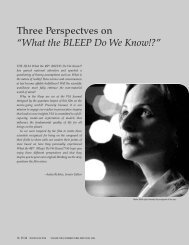The Heart of Brother Wayne Teasdale's Vision of ... - Vision in Action
The Heart of Brother Wayne Teasdale's Vision of ... - Vision in Action
The Heart of Brother Wayne Teasdale's Vision of ... - Vision in Action
Create successful ePaper yourself
Turn your PDF publications into a flip-book with our unique Google optimized e-Paper software.
<strong>Wayne</strong> had earlier established Consciousness as the goal and essence <strong>of</strong> bothtraditions. Why does he here say that though Christianity ends <strong>in</strong> Consciousness, as <strong>in</strong>Acqu<strong>in</strong>as’ “active reason” behold<strong>in</strong>g the Div<strong>in</strong>e Light,” it beg<strong>in</strong>s <strong>in</strong> a different place?We believe <strong>Wayne</strong> was mak<strong>in</strong>g a dist<strong>in</strong>ction here between “<strong>in</strong>stitutional” or“dualistic” Christianity and its “mystical” or “non-dual” branches.Buddhism beg<strong>in</strong>s with one’s <strong>in</strong>herent “Buddha nature or m<strong>in</strong>d” and ends with amore expanded version <strong>of</strong> it; we are all Buddhas, all One with Be<strong>in</strong>g-Awareness.Although Christianity also started out with a unitive creation myth with itsprist<strong>in</strong>e Paradise and harmony between God and man, <strong>in</strong>stitutional Christianity came toembrace the ontology <strong>of</strong> the Fall. Here it became dualistic, God versus man, man versuswoman and the other creatures <strong>of</strong> the earth, ultimately, Good versus Evil.Such dualism always implies a w<strong>in</strong>/lose situation; man must surrender to God orGod must surrender to man. Eventually one or the other must be negated. ThusChristianity <strong>in</strong> its ontology <strong>of</strong> the Fall beg<strong>in</strong>s <strong>in</strong> oppositional dualism, and then, throughthe <strong>in</strong>tervention <strong>of</strong> Christ, the God-man, ends <strong>in</strong> Re-union, <strong>in</strong> Paradise rega<strong>in</strong>ed.Buddhism never postulates an ontological dualism even at the beg<strong>in</strong>n<strong>in</strong>g; ouressence has always been our Buddha nature and we merely come to recognize it alongwith its universal presence.Institutional Christianity, however, even with its f<strong>in</strong>al embrace <strong>of</strong> the beatificvision, can never completely leave its dualistic roots. Even at the end, Man can at bestbehold the Godhead, never become fully One with It. Even the most evolved <strong>of</strong> theChristian mystics would hesitate before the boldness <strong>of</strong> H<strong>in</strong>duism’s fourth mahavaka: “Iam Brahman; I am, <strong>in</strong>deed, God.” <strong>The</strong>y can look upon the Great Light <strong>of</strong> Godhead but13



